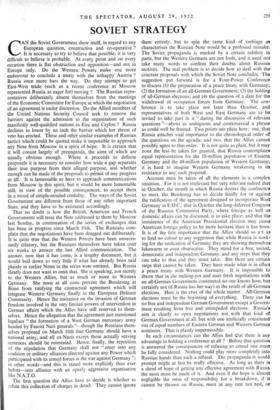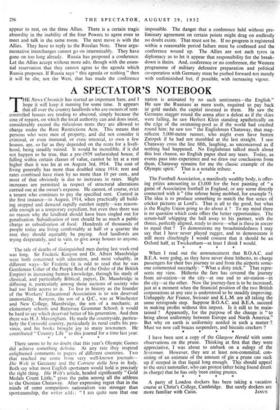SOVIET STRATEGY
CAN the Soviet Government show itself, in regard to any European question, constructive and co-operative ? \ It is necessary to try to believe that possible; it is very difficult to believe it probable. At every point and on every occasion there is flat obstruction and opposition—and not in Europe only. Do the Western Powers make one more endeavour to conclude a treaty with the unhappy Austria ? Russia once more bars the way. Do they attempt to get East-West trade (such as a recent conference at Moscow represented Russia as eager for) moving ? The Russian repre- sentatives deliberately absent themselves from the meetings of the Economic Committ'ee for Europe at which the negotiation of an agreement is under discussion. Do the Allied members of the United Nations Security Council seek to remove the barriers against the admission to the organisation of such manifestly well-qualified nations as Eire and Ceylon ? Russia declines to lower by an inch the barrier which her threat of veto has erected. These and other similar examples of Russian tactics which could be quoted make it impossible to approach any Note from Moscow in a spirit of luipe. It is certain that it will consist largely of propaganda, the aims of which are usually obvious enough. Where it proceeds to definite proposals it is necessary to consider how wide a gap separates their true purpose from their alleged purpose, and whether enough can be made of the proposals to permit of any progress at all. It is lamentable to have to approach communications from Moscow in this spirit, but it would be more lamentable still, in view of the possible consequences, to accept them in a mood of simple-minded credulity. The ways of the Soviet Government are different from those of any other important State, and they have to be estimated accordingly.
That no doubt is how the British, American and French Governments will treat the Note addressed to them by Moscow last Sunday, in continuation of the series of exchanges that has been in progress since March 10th. The Russians com- plain that the negotiations have been dragged out deliberately. It is quite true that the Western Powers have been unneces- sarily dilatory, but the Russians themselves have taken over six weeks to answer the last Allied communication. The answer, now that it has come, is a lengthy document, but it would boil down to very little if what has already been said plainly in earlier Notes in the series were omitted. But Russia clearly does not want to omit that. She is speaking, not merely to the Western Allies, but as much or more to Western Germany. She must at all costs prevent the Bundestag at Bonn from ratifying the contractual agreement which will integrate Western Germany finally in the European Defence Community. Hence the insistence on the invasion of German freedom involved in the very limited powers of intervention in German affairs which the Allies have still reserved to them- selves. Hence the allegation that the agreement just mentioned legalises " the formation of a West German mercenary army headed by Fascist Nazi generals "—though the Russians them- selves proposed on March 10th that Germany should have a national army, and all ex-Nazis except those actually serving sentences should be reinstated. Hence, finally, the repetition of the stipulation that Germany shall not " enter into any coalition or military alliances directed against any Power which participated with its armed forces in the war against Germany "; in other words—and this is-stated more explicitly than ever before—into alliance with an openly aggressive organisation like N.A.T.O.
The first question the Allies have to decide is whether to refute this collection of charges in detail. They cannot ignore them entirely, but to . spin the same kind of verbiage as characterises the Russian Note would be a profound mistake.
The Soviet propaganda is marked by a certain subtlety in parts, but the Western Germans are not fools, and it need not take many words to confirm their doubts about Russian motives. The real problem is to decide how to deal with the concrete proposals with which the Soviet Note concludes. The suggestion put forward is for a Four-Power Conference to discuss (1) the preparation of a peace treaty with Germany; (2) the formation of an all-German Government; (3) the holding of all-German elections; and (4) the question of a date for the withdrawal of occupation forces from Germany. The con- ference is to take place not later than October, and representatives of both West and East Germany are to be invited to take part in it " during the discussion of relevant questions "—about as ambiguous and controversial a phrase as could well be framed. Two points are plain here: one, that Russia attaches vital importance to the chronological order of the questions on the agenda; and two, that the Allies cannot possibly agree to that order. It is not quite as plain, but it may none the less be taken for granted, that Russia contemplates equal representation for the 18-million population of Eastern Germany and the 48-million population of Western Germany; it is hard to imagine Western Germany weakening in its resistance to any such proposal.
Account must be taken of all the elements in a complex situation. For it is not irrelevant but very relevant indeed that in October, the month in which Russia desires the conference to meet, the Bundestag has to decide finally for or against the ratification of the agreement designed to incorporate West Germany in E.D.C.; that in October the long-deferred Congress of the Russian Communist Party, where foreign as well as domestic affairs can be discussed, is to take place; and that the imminence of the American Presidential election may cause American foreign policy to be more hesitant than it has been. It is of the firk importance that the Allies should so a,:t as to lend no colour to any suggestion that while Russia is work- ing for the unification of Germany they are showing themselves lukewarm or even obstructive. They stand for a free, united, democratic and independent Germany, and any steps that they can take to that end they must take. But there are certain steps that cannot be taken. They have made what is in effect a peace treaty with Western Germany. It is impossible to throw that in the melting-pot and start fresh negotiations with an all-German Government constituted no one knows how, but certainly not (if Russia has her way) as the result of all-German elections. Here is the crux of the whole matter. All-German elections must be the beginning of everything. There can be no free and independent German Government except a Govern- ment resulting from free and unimpeded elections. Russia's aim is clearly to open negotiations not with that kind of German Government at all, but with one artificially constituted out of equal numbers of Eastern German and Western German nominees. That is plainly impermissible.
In such circumstances can the Allies feel that there is any advantage in holding a conference at all ? Before that question is answered the consequences of refusing to attend one must be fully considered. Nothing could play more completely into Russian hands than such a refusal. The propaganda it would prompt might at last be really effective. As long as there is a shred of hope of getting any effective agreement with Russia the most must be made of it. And even if the hope is almost negligible the onus of responsibility for a breakdown, if it cannot be thrown on Russia, must at any rate not rest, or appear to rest, on the three Allies. There is a certain tragic absurdity in the inability of the four Powers to agree even to meet and talk in the same room. The next move is with the Allies. They have to reply to the Russian Note. These argu- mentative interchanges cannot go on interminably. They have gone on too long already. Russia has proposed a conference. Let the Allies accept without more ado, though with the essen- tial reservation that they cannot agree to the agenda which Russia proposes. If Russia says " this agenda or nothing " then it will be she, not the West, that has made the conference impossible. The danger. that a conference held without pre- liminary agreement on certain points might drag on endlessly no doubt exists. That must not be. If no progress is registered within a reasonable period failure must be confessed and the conference wound up. The Allies are not such tyros in diplomacy as to let it appear that responsibility for the break- down is theirs. And, conference or no conference, the Western programme of military defensive preparation and political co-operation with Germany must be pushed forward not merely with undiminished but, if possible, with increasing vigour.



































 Previous page
Previous page